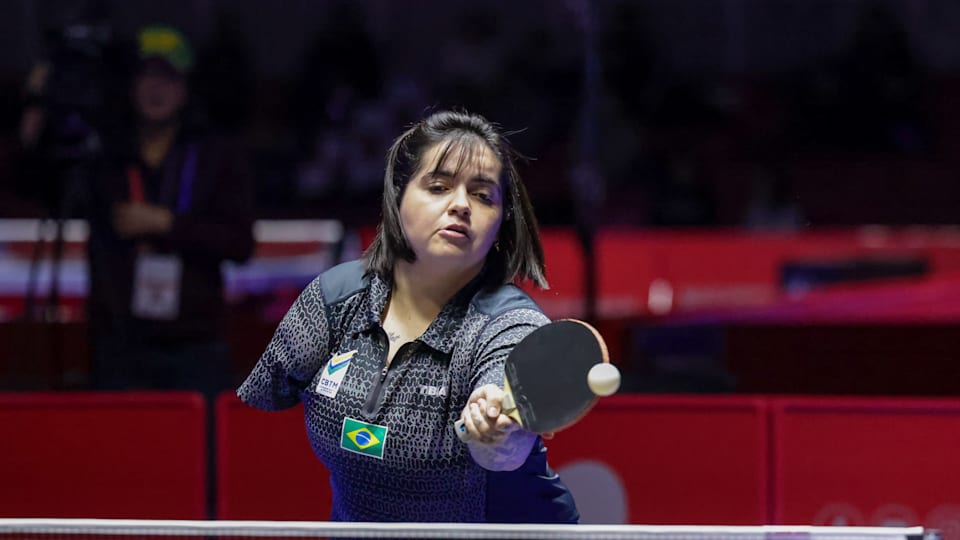Bruna Alexandre bringing together the table tennis Olympic and Paralympic worlds at Paris 2024: "Disability is nothing"

Until now, only one athlete had competed in table tennis at both the Olympic and Paralympic Games. This summer, that number is expected to double.
That's thanks to the efforts of Brazilian trailblazer Bruna Alexandre, who has been practising the sport for three-quarters of her 28 years.
The three-time Paralympian is set to make history at the Olympic Games Paris 2024 after being selected by the Brazilian Table Tennis Confederation as a member of Brazil's able-bodied women's team. (Brazil's National Olympic Committee has the exclusive authority for the representation of their respective teams at the Olympic Games, and Alexandre's participation at Paris 2024 would depend on her selection by the NOC.)
The Santa Catarina native has successfully bridged the gap between table tennis and Para table tennis as she seeks to follow in the footsteps of Poland's Natalia Partyka, a four-time Olympian and six-time Paralympian.
"I was always inspired by Natalia Partyka for all she achieved in her career," Alexandre told Olympics.com and World Table Tennis during the 2024 World Team Table Tennis Championships. "I was inspired by her so much that I focused a lot to beat her, and last year I managed to do it.
"I continue to be inspired by her; I think she started this history of table tennis: she played Olympic and Paralympic table tennis together and that gives me great inspiration."
Alexandre is missing her right arm, amputated as a result of thrombosis – a blood clot – when she was still a newborn.
But the lack of the limb doesn't bother her, and she's had the last 28 years to get used to living without it. And, of course, there's the added bonus, if you will, of being a role model and inspiration to others, just as Partyka was to her.
"I'm very happy to represent all people with disabilities and to show that everything is possible," she said. "I think this […] makes me more willing to want to continue and pursue my dreams, thinking not only of myself, but of all people with disabilities.
"I hope that someday this will be something normal in the world: a disabled person playing against someone who has both arms, regardless of disability."
How Bruna Alexandre got started in table tennis
The 28-year-old has dedicated the last 21 years of her life to table tennis and para table tennis, starting when she was seven. Speaking to Olympics.com in a separate interview last year, she recalled: "When I started, I didn't have any goals in table tennis. I went and the next thing I knew, I was already called up to the children's team.
"When I started playing in the state championships in Santa Catarina, I won against athletes from the national team, and I started to see that I could make a good career, improve more and more. And that's when the national federation saw me," she explained.
And she hasn't looked back since, forming part of the Brazilian national set-up since she was 11.
While it was a struggle at first to learn to deal with the coordination and balance needed in the sport given she has just one arm, she has since adapted thanks to practising other sports, including two popular ones in Brazil: futsal and skateboarding.
"Skateboarding provides this sense of body and balance. The strength of the entire body has to be stable. If you get soft, you stumble," she reasoned.
She has juggled playing against both regular and para table tennis opponents, winning the regular Brazilian national title twice. And playing able-bodied table tennis has helped with the balance issue, too.
"Today, for example, I have almost no difficulty with balance. I can reach every ball. I may be falling, but I can reach it."
Her key strength? "I can serve like people with two arms. Disability is nothing. We can do everything."
Differences between table tennis and para table tennis according to Bruna Alexandre
Having had so much experience of playing against both table tennis and para table tennis athletes, Alexandre has spotted a few differences. Some have to do with the two different versions of the sport. Others, unsurprisingly, have to do with resources and professionalism.
"[Para table tennis] warm-up, for example, takes one hour, but I have to get here four hours before the game [in regular table tennis]," she said at the World Team Championships.
"There is a huge focus and everyone has their own team, doing their job quietly. And that’s very different from what I experienced at the Paralympics. But now I have a private coach and I’m learning more and more too."
And on the sporting side? "The Olympic sport (able-bodied table tennis) is a much faster game."
She explained: "For example, when I played with the Japanese Hirano Miu [at the World Championships], the ball came back much faster. In the Paralympics it doesn’t come back so fast, apart from Natalia.
"So when I play [para table tennis], maybe it's be a little easier for me, because the ball comes a little slower. It is an adaptation I make when playing [regular table tennis]; I have to adapt more and more because of my balance."
After being selected for the Olympic Games Paris 2024, Alexandre shared on Instagram:
"I never thought that I would live and withstand so many challenges that life has imposed on me since my (first) two months of life, but today I can celebrate, sing and even cry and share with everyone who loves me and who follows my journey of becoming the FIRST ATHLETE IN THE HISTORY OF BRAZIL being called to play the Olympic and Paralympic Games in the same Olympics!"
A small piece of table tennis history awaits this summer.